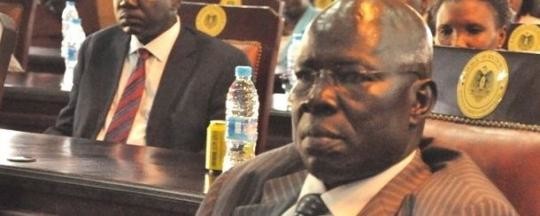The security bill introduced in South Sudan’s parliament this week will increase the powers of National Security Service agents while limiting the role of the National Security minister, depriving him of powers to hire personnel, oversee operations, or take disciplinary action.
Obuto Mamur Mete, an Equatorian general, is the national security minister since the last cabinet reshuffle in July 2013. He is nominally the boss of the longer-serving incumbent heads of the National Security Service’s two operational departments – Internal Security and External Security.
If passed, the National Security Bill will partly formalize the direct role of the president in supervising these departmental heads, known as ‘directors general,’ while limiting the minister himself to a largely advisory role.
According to a version of the bill obtained by Radio Tamazuj from an MP, purporting to be the version passed to the final reading, the minister is not allowed to set any policies without seeking the consent and approval of the president and the directors general of the two operational organs.
Article 13 of the new bill, which deals with the powers of the minister, states that the minister may make internal regulations on matters such as employment, command and discipline, and administration of funds only “upon receipt of report from each of the director generals and upon obtaining consent of the President.”
Under the new bill, the role of minister, supposedly the top official of the institution, is limited to giving daily briefings to the president, recommending senior officials to the president, and advising the president on the appointment of officers.
This means that the minister will not be able to hire at his own discretion even junior officers into the service. This is consistent with another provision of the bill that appointed officers on commissioning shall take an oath of loyalty before Salva Kiir personally.
Meanwhile, the bill also grants broad powers to the NSS directors general. Radio Tamazuj is informed that this matter received considerable attention within both the parliament and the presidency ahead of the controversial vote on the bill on Wednesday afternoon.
Article 15 of the bill deals with the powers of the directors general, giving them the authority to administer their own department and operations, and manage funds and assets given to the department.
Another two provisions (74-C and 75) make the directors general responsible for the accounting within their own respective department, while exempting them from audit requirements for at least some of the funds available to them.
“The Director General concerned shall be the Accounting Officer for the approved budget of the Service,” reads Article 74 (C).
Article 75 says the accounts of the NSS may be audited annually by the National Audit Chamber, except for “Security Funds” – a term not defined by the bill, but described in an earlier draft as “budget allocated specially for security operations.”
The bill does not specify whether the minister himself is able to review the financial expenditures of the operational organs, but does give him generally “oversight of the administration of the Service.”
The quoted provisions are consistent with the text of an earlier version of the bill published by Radio Tamazuj last week, since substantive changes on these parts of the text appear not to have been introduced.
Related:
Hundreds of MPs absent during vote on Kiir’s security bill (8 Oct.)
South Sudan MPs fail to show up for vote on Kiir loyalty oath (7 Oct.)
Bill requires South Sudan secret police to swear obedience (6 Oct.)




